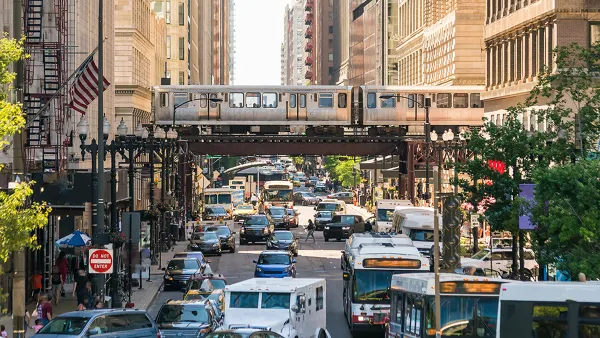According to an analysis of U.S. National Travel Surveys, the Millennial preference for non-automotive travel is mostly hype. Millennials show behavior similar to other age groups and respond to the economy.

Evelyn Blumenberg and Brian D. Taylor have heard the dominant narrative about the travel preferences of Millennials:
Among the many traits thought to make millennials unique is their travel. They drive less, ride public transit and bicycles more, and have a stronger desire to live in walkable urban communities. Or so the story goes.
But what if that story is wrong? Blumenberg and Taylor wondered the same thing and dug into the data for answers, examining data from the U.S. National Travel Surveys for 1990, 2001, and 2009, regarding "range of information on travel over time, detailed personal and household characteristics, and spatial information…" Their findings do indeed tell a different story:
In a nutshell, we found little evidence of a substantial cultural turn by millennials away from cars and suburbs. We found some evidence of generation-specific declines in driving among millennials, but the effects were modest. So what did have the biggest effect on millennial travel? The economy. Most of the drop in driving was likely due to the effects of the Great Recession.
To further elucidate the truth about Millennial mobility choices, the duo set out to answer eight questions, detailed further in the source article.
For more recent news on generational travel trends, see also a Planetizen post sharing the news about increasing vehicle miles traveled among young, low-income Americans.
FULL STORY: Millennial Travel: Who Knows About Kids These Days?

Planetizen Federal Action Tracker
A weekly monitor of how Trump’s orders and actions are impacting planners and planning in America.

Chicago’s Ghost Rails
Just beneath the surface of the modern city lie the remnants of its expansive early 20th-century streetcar system.

Amtrak Cutting Jobs, Funding to High-Speed Rail
The agency plans to cut 10 percent of its workforce and has confirmed it will not fund new high-speed rail projects.

Ohio Forces Data Centers to Prepay for Power
Utilities are calling on states to hold data center operators responsible for new energy demands to prevent leaving consumers on the hook for their bills.

MARTA CEO Steps Down Amid Citizenship Concerns
MARTA’s board announced Thursday that its chief, who is from Canada, is resigning due to questions about his immigration status.

Silicon Valley ‘Bike Superhighway’ Awarded $14M State Grant
A Caltrans grant brings the 10-mile Central Bikeway project connecting Santa Clara and East San Jose closer to fruition.
Urban Design for Planners 1: Software Tools
This six-course series explores essential urban design concepts using open source software and equips planners with the tools they need to participate fully in the urban design process.
Planning for Universal Design
Learn the tools for implementing Universal Design in planning regulations.
Caltrans
City of Fort Worth
Mpact (founded as Rail~Volution)
City of Camden Redevelopment Agency
City of Astoria
City of Portland
City of Laramie





























